
SEMINARS IN CANCER BIOLOGY
Scope & Guideline
Connecting experts to combat cancer.
Introduction
Aims and Scopes
- Molecular Mechanisms of Cancer:
Research articles often explore the underlying molecular pathways involved in cancer development and progression, including signaling pathways, gene expression regulation, and metabolic alterations. - Therapeutic Strategies and Innovations:
The journal emphasizes the exploration of new therapeutic approaches, including targeted therapies, immunotherapies, and the use of nanomedicine in cancer treatment. - Tumor Microenvironment and Metastasis:
A significant focus is placed on understanding the interactions between tumor cells and their microenvironment, which contribute to metastasis and therapeutic resistance. - Role of Extracellular Vesicles:
Extracellular vesicles are frequently studied for their role in cancer signaling, communication, and potential as biomarkers for diagnosis and therapy. - Emerging Technologies and Techniques:
The journal highlights advancements in technologies such as artificial intelligence, machine learning, and computational biology that enhance cancer research and treatment. - Cancer and Aging:
Research on the interplay between aging and cancer is a consistent theme, exploring how age-related factors influence cancer biology and treatment outcomes.
Trending and Emerging
- Artificial Intelligence in Oncology:
The use of artificial intelligence for diagnostics, treatment prediction, and personalized medicine is rapidly gaining traction, with numerous articles exploring its applications in oncology. - Immunotherapy and Immune Checkpoint Inhibitors:
Research on immunotherapy, particularly immune checkpoint inhibitors, is becoming increasingly prominent as a key strategy in cancer treatment, with a focus on enhancing efficacy and overcoming resistance. - Extracellular Vesicles as Therapeutic Agents:
There is a growing trend in studying extracellular vesicles not only as biomarkers but also as potential therapeutic agents and delivery systems for cancer therapies. - Cancer Metabolism and Nutritional Interventions:
Emerging research is focusing on the metabolic characteristics of cancer cells and the role of diet and nutrition in cancer prevention and therapy. - Microbiome and Cancer Interactions:
The relationship between the microbiome and cancer is gaining attention, with studies investigating how gut microbiota influences cancer progression and treatment response. - Targeted and Combination Therapies:
A trend towards combination therapies that target multiple pathways simultaneously is emerging, reflecting a more integrated approach to cancer treatment.
Declining or Waning
- Traditional Chemotherapy Approaches:
There is a noticeable decline in articles focusing solely on traditional chemotherapy methods, as the field shifts towards personalized medicine and targeted therapies that offer improved efficacy and reduced side effects. - Basic Cancer Biology without Translational Focus:
Papers that discuss basic cancer biology without a translational perspective are becoming less common, as the journal emphasizes studies that directly link laboratory findings to clinical applications. - Single-Pathway Inhibition Strategies:
Research dedicated to targeting single molecular pathways is decreasing, as more emphasis is placed on multi-targeted approaches that consider the complexity of cancer biology. - Invasive Surgical Techniques:
There has been a reduction in discussions around invasive surgical techniques, as the field is increasingly exploring less invasive options, such as precision medicine and minimally invasive therapies.
Similar Journals

NEOPLASMA
Transforming Cancer Research into Clinical PracticeNEOPLASMA is a prominent journal published by AEPRESS SRO, dedicated to the multifaceted field of oncology and cancer research. Since its inception in 1957, this esteemed publication has served as a vital platform for advancing the understanding of neoplastic diseases, disseminating high-quality research findings that contribute to clinical and laboratory advancements. Operating under a robust framework of peer review, NEOPLASMA holds significant credibility, as evidenced by its Q2 ranking in the Medicine (miscellaneous) category and Q3 rankings in both Cancer Research and Oncology for 2023. Furthermore, with an ISSN of 0028-2685 and E-ISSN 1338-4317, the journal fosters accessibility to valuable scientific content despite the absence of open access options. Positioned in Bratislava, Slovakia, NEOPLASMA continues to attract a global readership, making substantial contributions to the fields of biochemistry, genetics, and molecular biology as highlighted by its Scopus rankings. This journal is essential reading for researchers, professionals, and students looking to stay abreast of the latest developments in cancer research and treatment strategies.
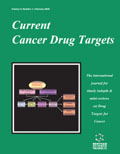
CURRENT CANCER DRUG TARGETS
Advancing targeted therapies for a cancer-free tomorrow.CURRENT CANCER DRUG TARGETS is a prominent academic journal published by Bentham Science Publishers Ltd, focusing on the critical intersection of cancer research and innovative drug development. Since its inception in 2001, this journal has offered a platform for the dissemination of cutting-edge research aimed at advancing targeted cancer therapies, contributing significantly to the fields of Cancer Research, Drug Discovery, Oncology, and Pharmacology. With a respectable impact factor and consistent ranking in its respective categories, including Q2 in Drug Discovery and Pharmacology, it positions itself as an invaluable resource for researchers, clinicians, and students alike. CURRENT CANCER DRUG TARGETS is dedicated to enhancing our understanding of novel therapeutic targets and methods, thereby fostering a collaborative environment for knowledge exchange in the ever-evolving landscape of cancer treatment.
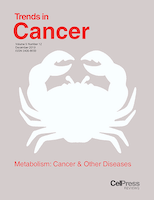
Trends in Cancer
Pioneering the Future of Oncology and Treatment StrategiesTrends in Cancer is a leading journal published by CELL PRESS, dedicated to advancing the field of cancer research and oncology. Since its inception in 2015, the journal has rapidly gained a reputation for excellence, securing both Q1 rankings in Cancer Research and Oncology categories for 2023 and boasting impressive Scopus ranks—#13 out of 404 in Medicine Oncology and #9 out of 230 in Biochemistry, Genetics and Molecular Biology, thus placing it in the top 4% of its field. The journal aims to publish high-quality, innovative research that offers new insights into cancer biology and treatment strategies. With a commitment to scholarly rigor and a broad scope that encompasses molecular mechanisms to therapeutic approaches, Trends in Cancer serves as an essential resource for researchers, professionals, and students eager to stay informed about the latest developments in cancer science. Although it is not an open-access journal, its contributions are pivotal in shaping the future of cancer research.

Oncologie
Illuminating the path to effective cancer prevention and diagnosis.Oncologie is a distinguished academic journal published by WALTER DE GRUYTER GMBH, focusing on the dynamic and vital field of oncology. Established in 1999 and continuously published until 2024, this journal provides a platform for high-quality research and advancements in cancer treatment, prevention, and diagnosis. With an ISSN of 1292-3818 and an E-ISSN of 1765-2839, it is indexed in various databases, contributing to its growing visibility. Although categorized in the Q3 quartile for oncology research as of 2023, Oncologie offers essential insights and fosters scholarly dialogue among researchers, professionals, and students interested in oncology. Its unique contributions aim to bridge the gap between theoretical frameworks and clinical applications, making it a valuable resource for those seeking to advance their knowledge and expertise in cancer research.

Cell Communication and Signaling
Unleashing Insights into Cell Communication DynamicsCell Communication and Signaling is a premier peer-reviewed journal published by BMC that has made significant contributions to the fields of biochemistry, cell biology, and molecular biology since its establishment in 2003. As an open access journal, it offers unrestricted access to high-quality research, fostering collaboration and innovation among scientists around the globe. The journal is distinguished by its Q1 ranking in all three relevant categories for 2023, underscoring its critical role in advancing the understanding of cellular communication mechanisms and signaling pathways. Positioned within the United Kingdom, Cell Communication and Signaling has been an invaluable resource for researchers, professionals, and students alike, ensuring that the latest findings are accessible to a diverse range of audiences. With an impressive Scopus ranking—placing it in the top percentiles within its subject areas—this journal continues to set the standard for excellence in the pursuit of understanding complex cellular interactions.
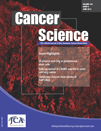
CANCER SCIENCE
Pioneering discoveries in cancer biochemistry and genetics.Cancer Science, an esteemed journal published by Wiley, stands at the forefront of oncology research, boasting an impressive impact factor and a classification in the Q1 category for its contributions in Cancer Research, Medicine, and Oncology as of 2023. Since its inception in 2003 and transitioning to an Open Access model in 2014, the journal has facilitated global dissemination of critical research findings, ensuring that vital information remains accessible to researchers, clinicians, and students alike. With its comprehensive scope covering cutting-edge discoveries in cancer biochemistry, genetics, and molecular biology, Cancer Science is recognized for its rigorous peer-review process and significant contributions to advancing our understanding of cancer. The journal, located at 111 River St, Hoboken, NJ, is an essential resource for anyone dedicated to improving treatment outcomes and pushing the boundaries of cancer research.
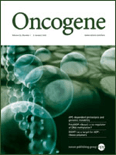
ONCOGENE
Pioneering Genetic Discoveries in OncologyONCOGENE is a premier peer-reviewed journal published by SpringerNature, serving as a crucial platform for innovative research within the fields of Cancer Research, Genetics, and Molecular Biology. With an impressive Impact Factor and a distinguished Q1 ranking across major categories, ONCOGENE publishes cutting-edge studies aimed at unraveling the complexities of cancer biology and genetic mechanisms. The journal has been a vital resource for the academic community since its inception in 1987, and it continues to foster rigorous scientific discussions and collaborations. Researchers, professionals, and students can access a wealth of critical insights and advances in cancer genomics and therapeutic approaches, cementing ONCOGENE’s role as a leading voice in the landscape of biomedical research. For comprehensive academic research, ONCOGENE remains an indispensable source of knowledge with contributions that significantly impact the evolution of cancer research and treatment strategies.

Advances in Cancer Biology-Metastasis
Pioneering Pathways in Cancer Research.Advances in Cancer Biology-Metastasis is an emerging journal published by Elsevier, aimed at advancing our understanding of the complexities of cancer biology, with a specific focus on the mechanisms and pathways related to metastasis. With an E-ISSN of 2667-3940, this journal offers a platform for researchers, professionals, and students in the fields of Cancer Research and Cell Biology to disseminate innovative findings and discuss novel therapeutic approaches. Though currently classified in the Q4 quartile across both Cancer Research and Cell Biology categories, the journal aspires to enhance its impact through rigorous peer review and high-quality publication. Positioned to cover the years from 2021 to 2024, it seeks to bridge gaps in foundational knowledge and promote collaborative research efforts that could pivot the current understanding of cancer metastasis. Researchers are encouraged to take advantage of this platform to advocate for advancements in cancer biology, making significant contributions that can influence both academic and clinical practices.
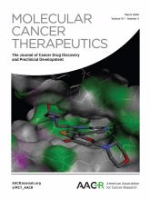
MOLECULAR CANCER THERAPEUTICS
Innovating the future of oncology, one study at a time.MOLECULAR CANCER THERAPEUTICS, published by the American Association for Cancer Research, is a premier journal dedicated to advancing the field of cancer research and therapy since 2001. With a notable impact factor reflecting its high-quality content, this journal stands out in the Q1 category for both Cancer Research and Oncology as of 2023. Researchers, clinicians, and students interested in innovative treatment strategies and molecular mechanisms can find valuable insights within its pages, bolstered by a rigorous peer-review process and a global perspective on cancer therapeutic developments. Although the journal operates under a subscription model, it provides comprehensive access to cutting-edge studies and reviews that drive forward the understanding of cancer biology and treatment modalities. The journal's impressive Scopus rankings further validate its influence within both oncology and the broader cancer research community, making it an indispensable resource for anyone committed to combating cancer through science.

Annual Review of Cancer Biology
Unraveling Innovations in OncologyAnnual Review of Cancer Biology is a pivotal journal published by Annual Reviews, specializing in the rapidly evolving field of cancer research. With an impact factor positioned in the distinguished Q1 quartile of Cancer Research, Cell Biology, and Oncology categories, this journal ensures that it showcases the highest quality of scholarly contributions. Indexed in Scopus, it ranks among the top in its fields, reflecting its strong influence and relevance, with remarkable percentiles indicating its esteemed position within the research community. Although not an open-access journal, it provides a comprehensive platform for advancing the frontiers of cancer biology through rigorously curated reviews, highlighting key developments, breakthroughs, and future directions that inform both academia and clinical applications. As a valuable resource for researchers, professionals, and students, the Annual Review of Cancer Biology serves as an essential guide for understanding and addressing the complexities of cancer biology today.